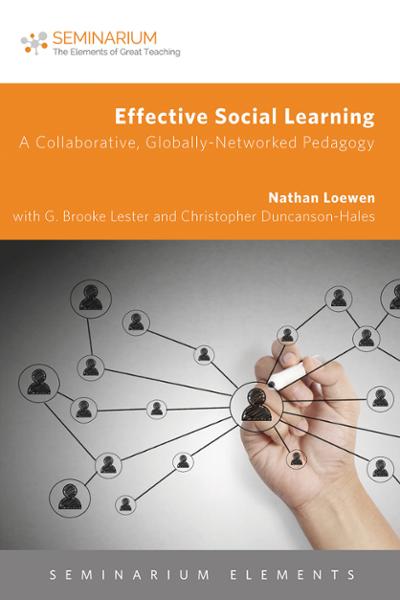The ground of higher education is shifting, but learning ecosystems around the world have much more space than MOOCs and trendy online platforms can fill, and Loewen shows how professors have an indisputable pedagogical edge that gives them a crucial role to play in higher education. By adopting the collaborative pedagogical process in this book, professors can create effective social learning experiences that connect students to peers and professional colleagues in real time.
Loewen moves beyond surface questions about technology in the classroom to a problem best addressed by educators in bricks-and-mortar institutions: if students are social learners, how do we teach in a way that promotes actual dialogue for learning? Designing learning experiences that develop intercultural competencies puts the test to students’ social inclinations, and engagement with course material increases when it’s used to dig deeper into the specificities of their identity and social location. Loewen’s approach to interinstitutional collaborative teaching will be explored with examples and working templates for collaborative design of effective social learning experiences. This is done by collaborative dialogue with G. Brooke Lester and Christopher Duncanson-Hales. As a group, Loewen, Lester, and Duncanson-Hales create a text that extends pedagogical innovation in inspiring but practical ways.
Loewen moves beyond surface questions about technology in the classroom to a problem best addressed by educators in bricks-and-mortar institutions: if students are social learners, how do we teach in a way that promotes actual dialogue for learning? Designing learning experiences that develop intercultural competencies puts the test to students’ social inclinations, and engagement with course material increases when it’s used to dig deeper into the specificities of their identity and social location. Loewen’s approach to interinstitutional collaborative teaching will be explored with examples and working templates for collaborative design of effective social learning experiences. This is done by collaborative dialogue with G. Brooke Lester and Christopher Duncanson-Hales. As a group, Loewen, Lester, and Duncanson-Hales create a text that extends pedagogical innovation in inspiring but practical ways.
- Publisher Fortress Press
- Format Paperback
- ISBN 9781451488760
- eBook ISBN 9781451489521
- Dimensions 6 x 9
- Pages 120
- Publication Date January 15, 2015
Endorsements
“With so much debate about the effectiveness of online versus traditional classroom teaching and learning in a global context, the author and contributors to this text demonstrate a promising collaborative pedagogy that opens up new possibilities for faculty and students alike seeking to engage one another within and across global networks and classrooms for more dynamic social learning.”
—Fred Glennon
Le Moyne College
“When this book first came to my attention, I was halfway through a one-month professional development program that my (Canadian) university is delivering in China for a group of professors from Chinese universities. It would have been really useful if I had seen it before I left Canada. I’m sure it will be a major resource the next time we deliver the program here. Our program depends entirely on intercultural collaboration, and the many insights into such collaborations will help us to improve both the face-to-face and online aspects of our program.”
—Walter Archer
University of Alberta
“Loewen, Lester, and Duncanson-Hales sketch how internet-based technology can successfully be put to practical use in our physical classrooms. Through illustrations of multiple victories and pitfalls, the team provide a large set of tools for navigating social learning environments. Effective Social Learning is essential reading for those interested in generating networked collaboration between student peers and scholars across international learning spaces.”
—Kristian Petersen
University of Nebraska–Omaha
“A highly informed, accessible, and practical guide for teachers keen to develop cross-cultural, innovative, engaged learning opportunities for their students. Effective Social Learning is prepared by experienced teachers who model transparency, collaborative teaching, and generosity of spirit.”
—Michel Desjardins
Wilfrid Laurier University
—Fred Glennon
Le Moyne College
“When this book first came to my attention, I was halfway through a one-month professional development program that my (Canadian) university is delivering in China for a group of professors from Chinese universities. It would have been really useful if I had seen it before I left Canada. I’m sure it will be a major resource the next time we deliver the program here. Our program depends entirely on intercultural collaboration, and the many insights into such collaborations will help us to improve both the face-to-face and online aspects of our program.”
—Walter Archer
University of Alberta
“Loewen, Lester, and Duncanson-Hales sketch how internet-based technology can successfully be put to practical use in our physical classrooms. Through illustrations of multiple victories and pitfalls, the team provide a large set of tools for navigating social learning environments. Effective Social Learning is essential reading for those interested in generating networked collaboration between student peers and scholars across international learning spaces.”
—Kristian Petersen
University of Nebraska–Omaha
“A highly informed, accessible, and practical guide for teachers keen to develop cross-cultural, innovative, engaged learning opportunities for their students. Effective Social Learning is prepared by experienced teachers who model transparency, collaborative teaching, and generosity of spirit.”
—Michel Desjardins
Wilfrid Laurier University
